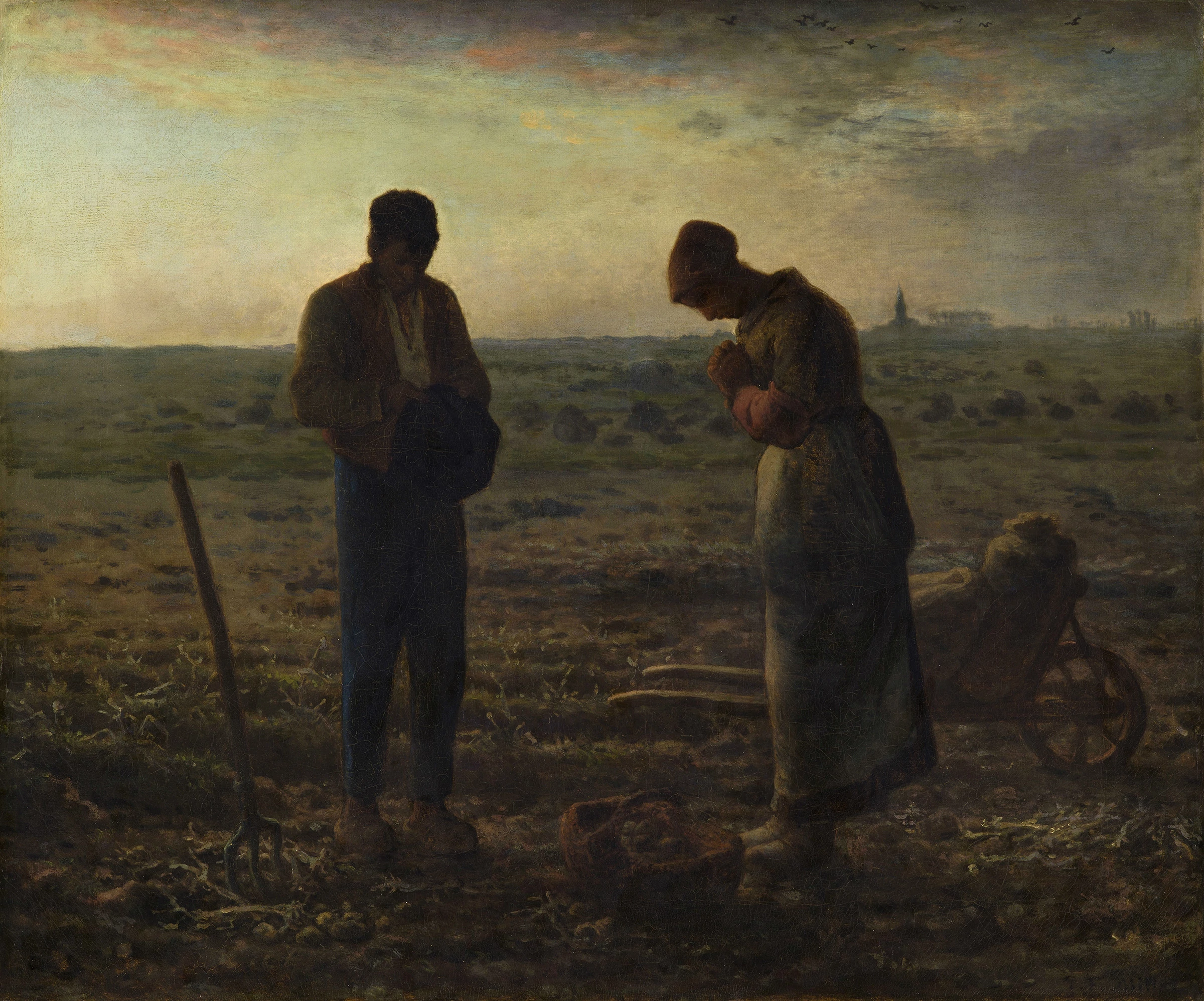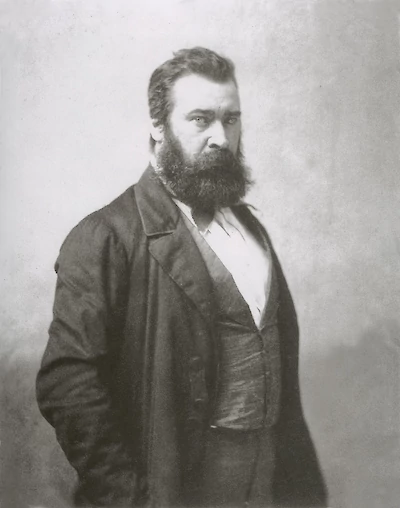

Jean-François Millet
A peasant I was born, and a peasant I will die
1814 – 1875It was All Saints’ Day. In the morning we saw that the sea was rough, and people said there would be trouble. The whole parish came to church. In the middle of mass a man rushed in, all dripping with salt water. It was an old sailor, well known for his courage in all the country-side. He began to say that he had come up from the beach, and had seen several vessels which the wind was driving upon the rocks, where they would certainly be wrecked. ‘We must go to their help at once,’ he said aloud, ‘and I have come to tell all those who are willing to go with me, that there is only just time to put out to sea, if we are to try and save them.’ Fifty men volunteered to go at once, and followed the old sailor without a word. We descended the cliffs to the beach, and there we saw a terrible sight : several vessels rushing, one after the other, at fearful speed, upon our rocks.
Our men put three boats out to sea, but before they had rowed ten strokes one boat sank, another was upset by a huge breaker, while a third was thrown upon the beach. Happily no one on board perished, and all our men reached the shore safely ; but it was plain that our boats could be of no use to the unhappy souls at sea. Meanwhile the vessels came rapidly nearer until they were only a few yards from the black rocks, covered with cormorants. The first had lost its masts, and looked like a great rolling mass. We all saw it advancing, and no one dared speak a word. It seemed to me, child that I was, as if death were playing with a handful of men, who were about to be crushed or engulfed in her cruel grasp. Suddenly an immense wave rose up like a raging mountain, caught the vessel and carried it towards the beach. Then another, yet more immense, dashed it against a rock on the water’s edge. There was an awful crash, then another, and in one moment the ship filled with water and was dashed in pieces. The sea was strewn with wreckage, with planks, masts and drowning men. Many tried to swim and sank. Our men threw themselves into the waves, and with the old sailor at their head made desperate efforts to save the poor fellows. Some were rescued, but many more were drowned or dashed to pieces on the rocks. The sea threw up hundreds of corpses, as well as quantities of cargo. For many days afterwards our people picked up these sad fragments on the beach, and stowed them away in their cellars, all damaged as they were by the salt water.
But this was not all. A second vessel approached. Its masts were gone. Every one on board was assembled on the crowded deck. We saw them all on their knees, and in their midst a man in black in the act of blessing them. Then a wave, as big as the cliffs, rolled her towards us. We seemed to hear another crash, as in the case of the first ship, but this one stood firm and did not move. The waves beat against her sides in vain. She stood as it were turned to stone. Every one made for land, for she was only two gunshots from the shore. One of our boats was made fast alongside, and filled with people instantly. Another boat, belonging to the ship, put off at the same time, boxes and planks were thrown into the sea, and in half an hour every one was safe on shore. This last ship was saved by a strange, chance. The bowsprit and forepart had been wedged in between two rocks, and the wave that dashed her on the reefs had saved her by miracle. This ship was English and the man whom we saw blessing his companions was a bishop. They were taken to the village and from there to Cherbourg. We soon hurried back to the beach. The third ship was thrown on the rocks and dashed to pieces. No one was saved this time, and the bodies of the unhappy crew were thrown up on the sand. Then came a fourth, fifth and sixth vessel, all of which were lost with their crew and cargo alike, upon the rocks. The tempest was furious. The wind was so violent that it could not be resisted. It stripped the houses of their roofs and tore off the thatch. So fierce was the gale that many birds, even the seagulls, which are used to storms, perished in the whirlwind.
The night was spent in trying to protect our own houses. Some of us laid big stones upon the roofs, others fastened ladders and poles to the roofs to secure them. The trees were bent to the ground, their boughs cracked and broke. All the fields were covered with branches and leaves. It was a terrible scene.
The next morning, All Saints’ Day, the men of the village came back to the beach. It was covered with dead bodies and wreckage which were brought together and laid at the foot of the rocks. Other vessels came into sight and were all dashed to pieces on our coast. So great was the desolation, it seemed as if the end of the world had come. Not one was saved. The rocks shivered them as if they had been glass, and cast the fragments over the cliffs.
As I was passing by a hollow in the cliff, I saw a large sail spread, as I thought, over a bale of merchandise. I lifted the sail and saw a heap of corpses. I was so frightened that I ran home, and found my mother and grandmother on their knees, praying for the shipwrecked sailors.
The third day, one other vessel came. This time some of the crew were saved. About ten men were brought off the rocks, all bruised or wounded. They were carried to Gruchy and nursed during more than a month, and after that taken to Cherbourg. But these unfortunate men were not yet saved from the sea. They embarked on a boat that was going to the Havre. A storm got up and they were all lost.
As for the dead, all the horses in the village were employed, during the first week, in bearing the corpses to the churchyard. They were buried in unconsecrated ground, and I was told they were not good Christians.
A few days after that, I picked up on the sand a small piece of carved wood, which must have belonged to one of the vessels which had been wrecked on our coast. When my mother saw it, she scolded me well, and making the sign of the cross, told me to take it back to the place where I had found it and to ask God’s pardon for my theft. This I did at once, feeling much ashamed of my action.
Since that time I have seen many tempests at my home, but no other has ever left so awful a picture of destruction upon my mind, or so vivid an impression of the littleness of man and of the power of the sea.”